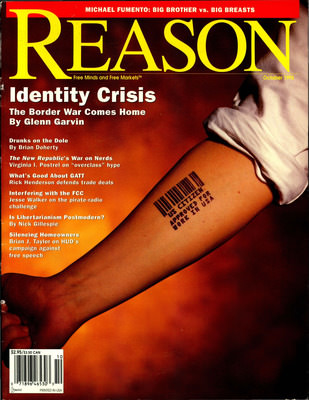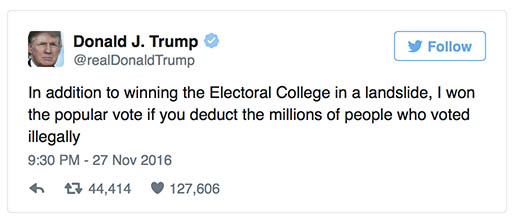Dumping DACA Will Likely Alter Census 2020 in Ways Favorable to Donald Trump
Feds announce they may share voluntarily provided information to speed up DACA deportations, making illegal-immigrant cooperation with authorities less likely


Today's controversial announcement by Attorney General Jeff Sessions that the Trump administration in six months will rescind the Deferred Action on Childhood Arrivals (DACA) program comes with a government information-sharing follow-up that could have wide-ranging effects on immigrant communities' cooperation (or lack thereof) with representatives from the state.
According to Betsy Woodruff at The Daily Beast, the Department of Homeland Security released a memo today making clear that "Immigration and Customs Enforcement officers will be able to use DACA recipients' personal information to deport them." Meaning, the people who voluntarily handed over their sensitive particulars to the federal government in the hopes of qualifying for non-deportation and a worker's permit may now see that same data used to boot them out of the country.
"Information provided to [the United States Citizenship and Immigration Services] in DACA requests will not be proactively provided to [Immigrations and Customs Enforcement] and [Customs and Border Protection] for the purpose of immigration enforcement proceedings, unless the requestor meets the criteria for the issuance of a Notice To Appear or a referral to ICE under the criteria set forth in USCIS' Notice to Appear guidance," the statement read. More from Woodruff:
"They're saying we will not give your information unless ICE tells USCIS they need it to deport you, which basically means we'll give your information out whenever ICE says it's necessary to deport you," said Leon Fresco, an immigration attorney who represents many DACA recipients. "That's the point."
The United States Census Bureau is currently gearing up for its constitutionally mandated decennial survey of all U.S. residents, legal or otherwise, from which gets derived new legislative districts, formulae for government money-transfers, and—crucially—a rearranged headcount for the House of Representatives. Even prior to today's announcement, the Trump administration's hard line on immigration was making the 2020 task more challenging.
"For immigrants, there's always been a fear that data could be shared with the immigration enforcement arms of the federal government," Arturo Vargas, a member of the Census Bureau's National Advisory Committee on Racial, Ethnic, and Other Populations, told Vox in a piece published Saturday. "Assuring these families that their census data is going to be safe and confidential is going to be a particular challenge for the 2020 census."
Such assurances will be all the more difficult to guarantee given the Bureau's own shameful history of assisting in the notorious World War 2 internment of Japanese-American citizens.

In the October 1995 issue of Reason, Glenn Garvin wrote a prescient piece about how the inflammatory immigration politics of the time could quickly limit the freedoms of perfectly legal U.S. residents. "When the government stockpiles information," Garvin wrote, in reference to calls for a national identification card "no matter how benign the intent, there is inevitably a malignant mutation somewhere along the way":
Even the supposedly apolitical head counters at the U.S. Census Bureau have been unable to keep their promises not to share their most intimate data with anyone else. During World War I, the Census Bureau provided the Justice Department with names and addresses of conscription-age young men to aid in the apprehension of draft dodgers.
And in an even more infamous case, it helped carry out the internment of Japanese Americans after Pearl Harbor. Each time a roundup of Japanese was planned in a new city, Census Bureau statisticians joined the meeting. They "would lay out on a table various city blocks where the Japanese lived and they would tell me how many were living in each block," recounted Tom Clark, the Justice Department's coordinator of alien control at the time. (Clark, later a Supreme Court justice, gave his account in an oral history for the University of California.) From there it was a simple matter for the U.S. Army to conduct block-by-block sweeps until all the Japanese were safely penned up in barbed wire.
Much more has since come out about that notorious episode, including this good 2015 USA Today piece from occasional Reason contributor James Bovard, who reminds us that "less than a dozen years ago, [the Bureau] provided the Department of Homeland Security with a massive report on how many Arab Americans live in each ZIP code." As is with the police departments in so-called "sanctuary cities" (such as Rudy Giuliani-era New York), Census Bureau pollsters understand the truism that residents who don't trust the Man won't talk to him.
So what happens when illegal immigrants aren't counted correctly? In February of this year, Salena Zito, one of the more perceptive observers of Trump's America, laid out in the New York Post how just a little undercounting here and there could help the president's political bottom line. Excerpt:
Since the Census is the determining factor in the number of House seats allocated to each state, those states with large numbers of illegal immigrants get extra seats (and more power to determine appropriations, electoral votes, etc.) at the expense of others.
States like Michigan, Ohio, Pennsylvania.
"Three of the four states that swung to Trump in the Upper Midwest lost seats in 2012, after the 2010 Census was taken," [Youngstown State University political science professor Paul] Sracic said. Ohio lost two; Michigan and Pennsylvania, one each. "Meanwhile, Texas gained a whopping four seats, while Nevada gained one."

More:
Sracic cites an American University study that found, "If only citizens were counted when apportioning House seats, Michigan and Pennsylvania would each see their one seat restored and Ohio would get back one of the two seats it lost after 2010."
Using that same methodology, California would lose five seats and Texas two seats.
Another way of saying all this is that three of the four Upper Midwest states that swung to Trump in 2016 would gain political power — electoral votes, too — if the number of illegal immigrants were reduced or not counted for census purposes in states such as Texas.
So the Trump administration, which is administering the 2020 Census (with the help of a Republican Congress) has material incentive to produce an undercount of illegal immigrants, and a track record of letting politics grossly distort the available research about illegal voting, all at a time when illegal immigrants have material incentive to tell Census takers to get bent. I think it's a safe bet that the House of Representatives after 2020 will not reflect an accurate headcount of the people who live in America.


Show Comments (53)